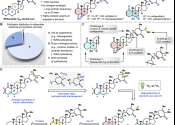Methodism is a movement of Protestant Christianity represented by a number of denominations and organizations, claiming a total of approximately seventy million adherents worldwide. The movement traces its roots to Reverend John Wesley's evangelical and revival movement in the Anglican Church. His younger brother Charles was instrumental in writing much of the hymnody of the Methodist Church. George Whitefield, another significant leader in the movement, was known for his unorthodox ministry of itinerant open-air preaching. Wesley, along with his brother and Whitefield, were branded as "Methodist" by opposing clergy within the Church of England. Initially Whitefield merely sought reform, by way of a return to the Gospel, within the Church of England, but the movement spread with revival and soon a significant number of Anglican clergy became known as Methodists in the mid eighteenth century. The movement did not form a separate denomination in England until after John Wesley's death in 1795. Some 18th century branches of Methodism include, the earliest Methodists, Calvinistic Methodists, from the work of George Whitefield and Howell Harris,, the Welsh Methodists, and the Methodism of John Wesley. The influence of Whitefield and Lady Huntingdon on the Church of England was a factor in the founding of the Free Church of England in 1844. Through vigorous missionary activity Methodism spread throughout the British Empire, and the work of Whitefield from an early time introduced Methodism to the United States, and beyond.
Early Methodists were drawn from all levels of society, including aristocracy.[1] But the Methodist preachers took the message to labourers and criminals who tended to be left outside of organised religion at that time.[citation needed] Wesley himself thought it wrong to preach outside a Church building until persuaded otherwise by Whitefield.
Doctrinally, the branches of Methodism following the Wesleys are Arminian, while those following Harris and Whitefield are Calvinistic.[2] Wesley chose to break with the Church of England's Calvinistic position, which Whitefield remained faithful to. This caused serious strains on the relationship between Whitefield and Wesley, with Wesley becoming quite hostile toward Whitefield in what had been previously very close relations. Whitefield consistently begged Wesley to not let these differences sever their friendship and, with time, their friendship was restored, though this was seen by many of Whitefield's followers to be a doctrinal compromise. As a final testimony of their friendship, John Wesley's sermon on Whitefield's death is full of praise and affection. Methodism has a very wide variety of forms of worship, ranging from high church to low church in liturgical usage. Both Whitefield and the Wesleys themselves greatly valued the Anglican liturgy and tradition, and the Methodist worship in The Book of Offices was based on the 1662 Book of Common Prayer.






